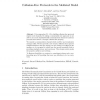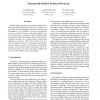82 search results - page 8 / 17 » Deciding knowledge properties of security protocols |
CTRSA
2011
Springer
13 years 1 months ago
2011
Springer
Abstract. Many real-world protocols, such as SSL/TLS, SSH, IPsec, IEEE 802.11i, DNSSEC, and Kerberos, derive new keys from other keys. To be able to analyze such protocols in a com...
LOPSTR
2001
Springer
14 years 2 months ago
2001
Springer
In this paper we define a sequent calculus to formally specify, simulate, debug and verify security protocols. In our sequents we distinguish between the current knowledge of prin...
CRYPTO
2008
Springer
13 years 11 months ago
2008
Springer
Prior approaches [15, 14] to building collusion-free protocols require exotic channels. By taking a conceptually new approach, we are able to use a more digitally-friendly communic...
SRDS
2000
IEEE
14 years 2 months ago
2000
IEEE
Reliable multicast protocols can strongly simplify the design of distributed applications. However, it is hard to sustain a high multicast throughput when groups are large and het...
EUROCRYPT
2009
Springer
14 years 10 months ago
2009
Springer
The notion of Zero Knowledge Proofs (of knowledge) [ZKP] is central to cryptography; it provides a set of security properties that proved indispensable in concrete protocol design...


